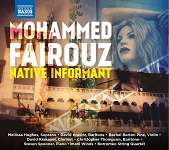|
Back
04/30/2013
“Native Informant”
Mohammed Fairouz: Native Informant – Tahwidah – Chorale Fantasy – Posh – For Victim – Jebel Lebnan
Mellissa Hughes (soprano), David Kravitz (baritone), Rachel Barton Pine (violin), David Krakauer (clarinet), Christopher Thompson (baritenor), Steven Spooner (piano), Imani Winds & Borromeo String Quartet
Recorded at Oktaven Audio, Yonkers, NY (March, April, May, 2012) – 78’22
Naxos of America #: 8.559744 – Booklet in English
   

Composer Mohammed Fairouz’s Naxos release “Native Informant” is a compilation of works by this 28-year old composer from 2008-11. As protean as Fairouz obviously is, if there is any disappointment about this recording is that it is only a small example of his compositional range he has displayed in orchestral works, vocal music, opera, solo instrumentals, chamber works and most impressively, his hybrid structures.
Fairouz details in his liner notes that the title “Native Informant”, is in fact, half ironic, he is an Arab-American composer based in New York and has already explored musical forms on five continents. But he is truly connected to his time, he can be seen on YouTube, for instance, talking about his symphonic narration to the graphic novel In the Shadow of No Towers. Mostly though, he is also a contemporary classical composer chronicling the issues of his time. As this disc illustrates also, he is a composer, reflecting and responding to a diverse, moveable and culturally perilous era.
Tahwidah is the opening track and gets jarringly right down to Fairouz’s themes. David Krakauer’s clarinet mournfully wends around soprano Mellissa Hughes’ vocal of poetry by Mahmoud Darwish. It is the words of a mother addressing her son’s grave, translated by the composer to English from Arabic. “If you’ll not be a rain, my love, then be a tree, drenched in fertility...” Hughes’ valiantly shrill vocal is just heartbreaking.
The Borromeo String Quartet performs the multi-faceted title work Native Informant, a five movement string work that blends many cultural markers and classicist folk forms from Arabic, Hassidic, and Eastern European musical templates and comprises Fairouz’s orchestral drama. Lyric Sketch is an exquisitely baleful violin double by Rachel Barton Pine. Pine then snaps out of the torpor for the string Rounds that is just vibrant fiddler fanciful. Next For Egypt showcases a searching, unsettled, that has a taut string line to nowhere, obviously Fairouz’s response to the instability in the region. It is followed by the vibrant, almost Coplandesque Scherzo. On Lullaby of the Ex-Soldat we have a tragic evocation played with transcendence by Pine. Some of the seriousness of content, both narratively and compositionally would obviously be more vivid in a live performance.
A couple of filler tracks lighten the intensity: Blue Sea Songs and Posh are sung with lithe drama by “baritenor” Christopher Thompson who references Ned Rorem, and you can hear the line phrasing of Rorem, in homage, by Fairouz. He has, in fact, his own bona fides, to return the “art” song, without doubt.
Then For Victims predictably is a somber tone poem that leads into a turbulent and unsettling soundtrack of grief. The dominant cello, impressionistic, but an ambient questioning dirge for our time. Song of the Victims, with text by David Shapiro (“They have used the bodies of children/as improvised bridges...”) is essentially an art song documentary, and could not be a more serious artistic statement.
In contrast, the layered confrontational musical sarcasm of Jebel Lebnan is so scabrous in its opening section Bashir’s March (which tonally recalls of Stravinsky’s Soldat). Delivering Fairouz’s raw editorial punches is the stellar woodwind ensemble Imani Winds. On Interlude: Nay there is the serene reckoning. Nay is the name of the Arab flute that is heard in the distant mountains, has such a haunted, soul searching musicality. The distances contain floating musical DNA that may have been mixed a thousand years ago in Chinese classicism. Fairouz explains the intent, narratively and musically through all of the pieces in his fascinating liner essay. This is symphonic verity more than a foreboding musical world and though rather relentless on this collection, a sample of completely vital work by a gifted young composer.
Lewis Whittington
|